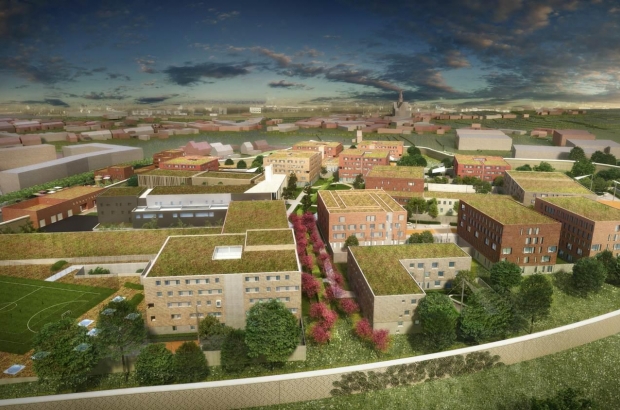- Daily & Weekly newsletters
- Buy & download The Bulletin
- Comment on our articles
Magistrates spend weekend experiencing prison conditions at new Haren jail
Some 55 Belgian magistrates and members of the judicial system spent a weekend locked up in the new Haren "mega-prison" as part of an exercise intended to let them experience life in prison first-hand, and therefore better understand the psychological impact.
The group of voluntary participants, joined by journalists, arrived at 9.00 on Saturday and remained until Sunday afternoon. During this time, they experienced the same detention conditions as actual prisoners.
In addition to serving as an empathy exercise for those who pass down the sentences, the justice department said the experiment allowed prison staff to get their bearings in the new detention centre, which opens at the end of the month.
“On the one hand, the prison staff can prepare for the actual opening of the prison and on the other hand, the magistrates will get an idea of the daily life of the inmates and the functioning of a prison,” explained justice minister Vincent Van Quickenborne.
“This will undoubtedly help them to assess whether deprivation of liberty is the best solution for a person who has made a mistake.”
Among the group were criminal judges, investigating judges, prosecutors and judicial trainees.
Each followed the normal daily schedule of prisoners, eating the same meals and participating in the same mandatory activities such as kitchen and laundry duty, and a 22.00 lights-out bedtime.
The code word of “terminus” was decided upon for any participant who decided the experience had become too unpleasant to continue for whatever reason.
A Bruzz journalist who participated in the exercise described their cell as very cold, saying that the thin sheet they were given was not enough to keep warm.
“I woke up several times from the cold. The morning after, it turned out that they had forgotten to give me a blanket as well,” Charlotte Deprez wrote.
Deprez and others expressed criticism that included poor communication, difficult doors and a non-functioning public address system.
“This will never be OK by 30 September,” Deprez reported one ‘inmate’ as saying.
Other participants from the judicial side reportedly said the experiment would have no effect on their work: “We make a weighted decision anyway and are not just going to lock someone up. Sometimes there's just no other solution, for example when the suspect has no official residence.”
There was some praise for the more ‘open’ aspects of the newer prison, but others pointed out that having a television in the room did little to curtail a sense of imprisonment and dependency.
“It's a lot better than the other prisons, but that's also not hard when you see what we compare it to,” one said.
The new Haren prison will have a capacity of 1,190 inmates and aims to replace detention centres in Forest, Saint-Gilles and Berkendael.
Unlike traditional prisons, it functions more as a village composed of smaller buildings and separate living units, each with about 30 places.
This allows for a diversity of inmates according to their profiles and ages, with living units adapted to fit each group. Inmates will be able to move more freely in each “village” using a badge system.
Open or semi-open detention will also be encouraged, based on an analysis of each prisoner's profile.



















